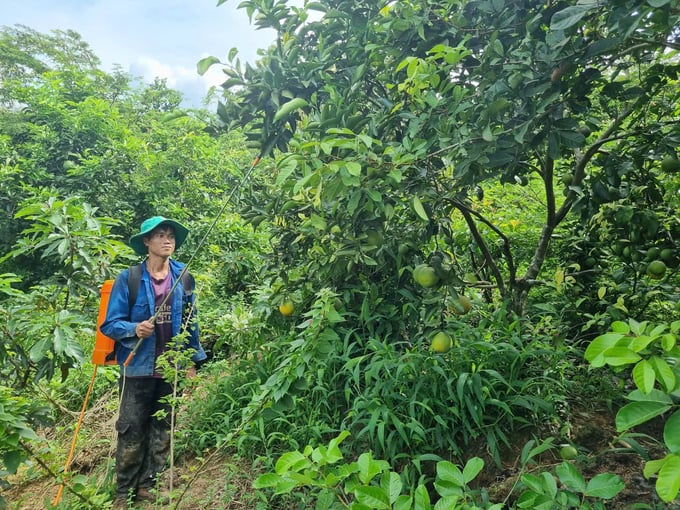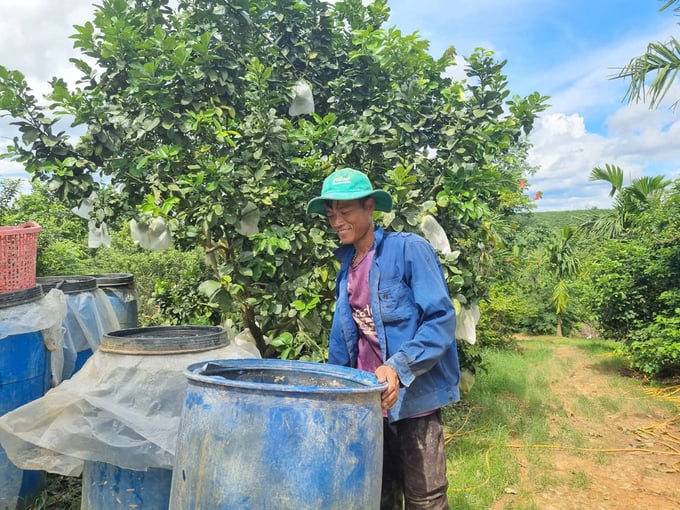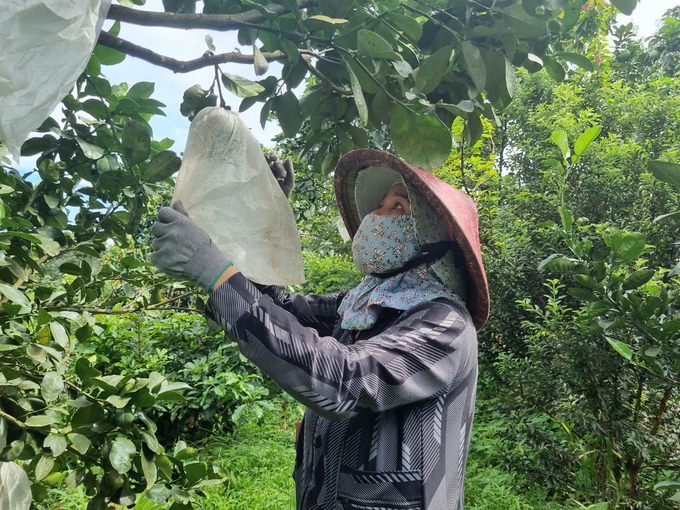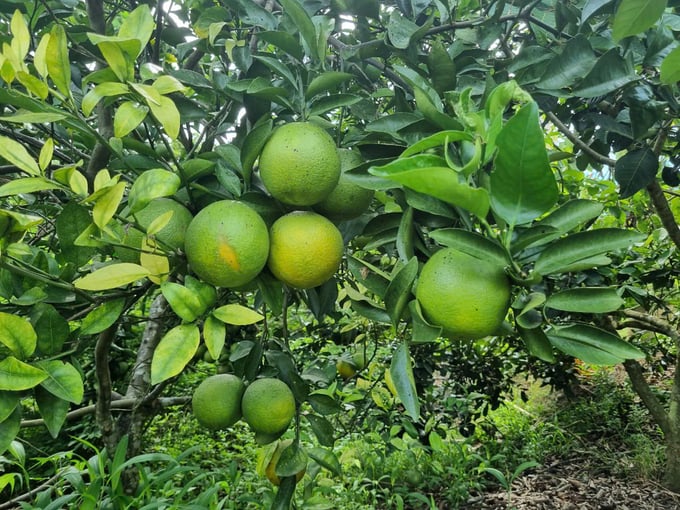June 2, 2025 | 04:02 GMT +7
June 2, 2025 | 04:02 GMT +7
Hotline: 0913.378.918
June 2, 2025 | 04:02 GMT +7
Hotline: 0913.378.918

Mr. Nguyen Van Ghi's family garden avoids using toxic chemicals. Photo: Tuan Anh.
The use of biological pesticides is becoming an inevitable trend in sustainable agriculture. In Kon Tum province, farmers are increasingly focusing on biological pesticides and natural herbal products while minimizing the use of chemical pesticides, which are slow to decompose and harmful to both the environment and human health.
Dak Ha district is considered the capital of coffee and fruit trees in Kon Tum province. It is also home to numerous businesses and cooperatives that produce and process agricultural products for export. The growing demand from consumers for safe, organic agricultural products has become a major driver behind the widespread adoption of biological pesticides in recent years.

Mr. Ghi’s family garden only uses biological products to manage pests and diseases. Photo: Tuan Anh.
In his 2.5-hectare, multi-crop garden, filled with fruit trees such as durian, grapefruit, jackfruit, guava, and oranges, Mr. Nguyen Van Ghi (Group 2, Ha Mon commune, Dak Ha district) shared that his family almost never uses chemical pesticides, relying solely on biological alternatives.
"My family lives right in the garden, so if we used chemicals, the environment would be polluted, and we wouldn’t be able to live here," Mr. Ghi explained. He further noted that excessive use of chemicals over time would destroy beneficial organisms in the soil.
Beaming with pride as he surveyed his lush, green garden, Mr. Ghi revealed that since the start of the year, his family hasn't spent a single penny on chemical fertilizers or pesticides. Instead, they have relied on composted cow manure and probiotic solutions derived from fish protein.
Evaluating the effectiveness of biological pesticides, Mr. Ghi said that biological pesticides are very effective but one must know how to use them. "Using biological pesticides is similar to oriental medicine for humans, it cannot immediately eradicate pests but requires time and repeated use. Especially for durian trees, which are often affected by fungus and aphids, so they must be sprayed regularly. If biological pesticides are not used but chemicals are used, people risk dying before the garden," Mr. Ghi shared.

People are increasingly interested in biological pesticides and ensuring product quality. Photo: Tuan Anh.
The Sau Nhung Agricultural - Production and Trading Cooperative (Ha Mon commune, Dak Ha district) currently comprises 32 official members and 81 affiliated households. The cooperative manages over 300 hectares of coffee, with an average yield of 3.5 to 4.5 tons per hectare annually. In recent years, the cooperative has shifted its production towards organic methods. To date, 51 hectares of their coffee have been certified under VietGAP and HACCP standards.
Mr. Nguyen Tri Sau, Director of the Sau Nhung Agricultural - Production and Trading Cooperative, emphasized that cooperative members are increasingly adopting biological pesticides as part of their transition to safe, organic, and eco-friendly agricultural practices.
"Chemical pesticides are too toxic and pose significant risks to human health. People are becoming more aware of this issue and are switching to biological products," Mr. Sau explained. "Additionally, for farmers aiming to export their products, the only path forward is green agriculture, which ensures product quality in line with market standards."
Mr. Sau noted that farmers today prioritize the value of coffee products over sheer output. In the past, a hectare of coffee might have produced 7-8 tons of beans, but the use of chemical pesticides came at the cost of health. Now, with biological pesticides, yields might be reduced to about 5 tons per hectare, but the products are healthier, and their value is higher.
"For biological pesticides to be effective, farmers need to closely monitor their crops. As soon as they detect pests or diseases, they must act quickly to contain them. While chemical pesticides deliver rapid results, they also destroy beneficial soil organisms, including the natural enemies of pests," Mr. Sau elaborated.
According to Mr. Bui Duc Trung, Deputy Head of the Department of Cultivation and Plant Protection of Kon Tum province, using biological pesticides in agricultural production offers numerous advantages, such as leaving minimal residue in agricultural products, being safe for both humans and the environment, and decomposing quickly in nature. These factors create favorable conditions for ensuring the quality of agricultural goods.
The increasing market demand for safe agricultural products, such as those meeting VietGAP, GlobalGAP, and organic standards, aligns with the growing use of biological pesticides. This trend also supports the development of designated cultivation areas. Moreover, biological pesticides are particularly useful for managing harmful organisms in large-scale, concentrated production models across the province.

Increasingly stringent consumer demands and export product standards are the driving force for farmers to use biological pesticides. Photo: Tuan Anh.
According to Mr. Trung, the market share of biological pesticides in Kon Tum province has seen significant growth in recent years, driven by the need for safe, green, and sustainable agricultural production practices.
To further expand the use of biological pesticides in the province, Mr. Trung emphasized that the Department will continue to collaborate closely with relevant units and local authorities. Their efforts will focus on raising awareness, encouraging adoption, and providing guidance and support. This includes disseminating technical standards and regulations related to biological pesticides. At the same time, the Department will promote the development project for biological pesticides, with goals set for 2030 and a vision extending to 2050. This initiative aims to ensure that organizations and individuals involved in crop production are well-informed and actively participate.
“We will advise the Department of Agriculture and Rural Development to propose solutions and policies to the Provincial People's Committee, tailored to the province's actual conditions, to promote the production, trade, and use of biological pesticides in the coming years,” Mr. Trung explained.
He further noted that new-generation biological pesticides are highly effective, have a broad spectrum of action, and are easy to apply. These qualities are expected to attract more farmers to adopt them. Moreover, these biological pesticides decompose quickly, have short isolation periods, and leave minimal toxic residues. This makes them particularly suitable for crops requiring high levels of safety, such as vegetables, fruits, and tea.
Translated by Quynh Chi

(VAN) Several scientists and farmers are experimenting with soil treatment in some key durian-growing regions such as Cai Lay (Tien Giang), Dak Song, Gia Nghia, and Dak R’lap (Dak Nong).
/2025/05/25/4127-3-073637_820.jpg)
(VAN) Thanks to the promotion from an FAO-implemented project, vegetable production in greenhouses in Moc Chau has seen strong development, from 1.5 hectares in 2021 to nearly 50 hectares in 2024.

(VAN) FAO has recently supported USD 140,000 to implement the project 'Risk mitigation human-animal interface risks through disease control initiatives in pig farming.'

(VAN) The People's Committee of Tra Vinh province has approved an adjustment to the investment policy for the Green Hydrogen Plant project, increasing its area to approximately 52.76 hectares.
![Reducing emissions from rice fields: [2] Farmers’ commitment to the soil](https://t.ex-cdn.com/nongnghiepmoitruong.vn/608w/files/news/2025/05/05/dsc08881jpg-nongnghiep-140632.jpg)
(VAN) Clean rice cultivation model in Thuong Tan commune, Bac Tan Uyen district, is assisting local residents in achieving sustainable agriculture by substantially reducing costs, increasing productivity, and protecting the environment.

(VAN) At the conference to disseminate Resolution No. 68, AgriS introduced its digital agricultural ecosystem and reaffirmed its commitment to accompanying the Government in promoting private sector development and sustainable agriculture.

(VAN) 'Blue Ocean - Blue Foods' initiative is designed to restore marine ecosystems and establish sustainable livelihoods for local communities by cultivating a minimum of 1,000 hectares of cottonii seaweed in the first three years.